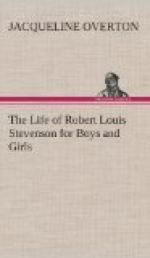All were eager to visit the schooner, which they called Pahi Mani, meaning the shining or the silver ship. The chiefs tried to measure its dimensions with their arms. The liveliest curiosity was shown about everything; the red velvet cushions, the looking-glasses, and the typewriter pleased particularly. A photograph of Queen Victoria hung in the fore-cabin and was always described to the island callers as Vahine Haka-iki Beritano, which meant literally, woman-great-chief Britain. It was a surprise to find how much many of them already knew about her.
Some afternoons the Casco swarmed with these strange visitors who were always delighted at the refreshments of ship’s biscuits and pineapple syrup and water offered them. A certain chief was particularly taken with a pair of gloves belonging to Mrs. Stevenson, senior. He smelled of them, called them British tattooing, and insisted on her putting them on and off a great many times.
The entire family fell quickly into the island mode of living; dressed as the white inhabitants did; ate all the strange kinds of native food; and when ashore lived in the native houses, which resembled bird-cages on stilts. The climate suited them to perfection, and Stevenson particularly benefited by it, bathing daily in the warm surf and taking long walks along the beach in search of strange shells.
“Here we are,” his mother wrote to Cummie, “in a little bay surrounded by green mountains, on which sheep are grazing, and there are birds very like our own ‘blackies’ singing in the trees. If it were not for the groves of cocoanut palms, we might almost fancy ourselves in our own dear land. But the climate here is simply perfect. Of course it is hot, but there are always fresh breezes.... We have our principal meal at twelve o’clock, and spend the after part of the day on shore ... bathing, gathering shells, knitting, or reading. Our Japanese cook and steward just sets out the table with cold meats, fruit, and cake so that we can take our other meal at any time in the evening that suits us.
“Fanny and I are dressed like natives, in two garments. As we have to wade to and from the boat in landing and coming back, we discard stockings, and on the sands we usually go barefoot entirely. Louis wears only a shirt and trousers with the legs and arms rolled up as far as they will go, and he is always barefooted. You will therefore not be surprised to hear that we are all as red as lobsters. It is a strange irresponsible half savage life, and I sometimes wonder if we shall ever be able to return to civilized habits again.
[Illustration: South Sea houses]
“The natives are very simple and kindly people. The Roman Catholic priests have persuaded them to give up their constant wars and the practice of cannibalism, though only within recent years....
“Louis has learned a good many words of the language, and with the help of signs can contrive to carry on a conversation, but I have stuck fast with two words: ‘ka-oha’ which means ‘How do you do?’ ‘thank you,’ and ‘good bye,’ and I am not quite sure how much else, and ‘Mitai,’ meaning good, nice, pretty, kind. I don’t expect to get beyond these, but it is wonderful how much one can express with them....




